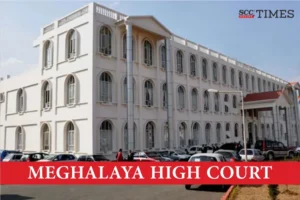Meghalaya High Court: In a writ petition by a murder convict against the rejection of a plea for remission, the Single-Judge Bench of W. Diengdoh, J. allowed the petition, considering that authorities concerned failed to seek the relevant report of the Superintendent of the Prison wherein the accused was interned and the opinion rendered by Presiding Judge did not take into consideration the guidelines of the Supreme Court in Laxman Naskar (Life Convict) v. State of W. B., (2000) 7 SCC 626.
On 12-12-2005, a Tourist Taxi was hired. Since the Taxi did not return home, the owner reported the matter to the President of the Shillong Greater Tourist Taxi Association, who in turn lodged an FIR for offence under Section 382/302/201/34 of the Penal Code, 1860 (‘IPC’). The present accused, along with four other accused persons, were arrested. The present accused was convicted for murder and theft with sentence to undergo imprisonment for life for the offence under Section 302 of the IPC.
The present accused sought remission of sentence on the ground that he completed more than 14 years of imprisonment as provided under Section 432 read with Section 433-A of the Code of Criminal Procedure, 1973 (‘CrPC’). The authorities concerned rejected his plea for remission. Hence, the present petition.
Analysis and Decision
The Court noted that the present accused had completed 19 years of imprisonment. Further, the Court pointed out that Section 433-A of the CrPC states that, – notwithstanding anything contained in section 432, where a sentence of imprisonment for life is imposed on 2025:MLHC:198 9 conviction of a person for an offence for which death is one of the punishments provided by laws, or where a sentence of imprisonment for life, such person shall not be released from prison unless he had served at least fourteen years of imprisonment.
Perusing the Presiding Judge’s opinion, the Court noted that it was opined therein that, how the crime was committed was brutal and gruesome which is disturbing, also that there is a possibility that the crime may be repeated if released on remission and finally that the crime was committed by a syndicate which is still on the run.
The Court stated that under Section 432 of the CrPC, it is mandated that is that the opinion of the presiding Judge of the Court who had passed the sentence was required to be obtained.
Even if the judge who had passed the sentence is no longer available as in the present case, it would be but proper for the opinion to be sought for or to be given by the succeeding Sessions Judge of the concerned court.
The Court opined that the opinion was given by the District Judge, Shillong, who had not stated that he did so in his capacity as the Sessions Judge, rendered any such opinion as not tenable in law. Therefore, the Court held that the authority concerned, while passing the impugned order, could not have relied on the opinion of the District Judge, and that such impugned order was passed on a wrong premise.
The Court underscored that the relevant authority should have sought the report of the prison authorities to study the case of the applicant/convict within the parameters of the guidelines laid down in Laxman Naskar (supra).
The Court stated that the Presiding Judge did not take the guidelines into consideration while giving his opinion
“Instead, the opinion of the Presiding Judge reflected only the observations made based on the judgment of the Trial Court, that too, only on the observations that the crime committed was done so in a brutal manner and furthermore, that there appears to be a syndicate at work which is still at large, meaning that the applicant/convict is also part of such syndicate, when no such observations or findings was ever made by the Trial Judge who has passed the initial judgment.”
The Court stated that the authorities concerned failed to seek the relevant report of the Superintendent of the Prison wherein the present accused was interned and as a result, while seeking the opinion of the District Judge, he has also failed to give his opinion based on the factors which ought to have been considered, some of which are found stipulated by the Supreme Court in Laxman Naskar (supra).
[Nabam Tai v. State of Meghalaya, 2025 SCC OnLine Megh 225, decided on: 24-03-2025]
Advocates who appeared in this case :
For the Petitioner/Appellant(s): Mr. B. Deb, Adv.
For the Respondent(s): Mr. N.D. Chullai, AAG with Ms. R. Colney, GA

